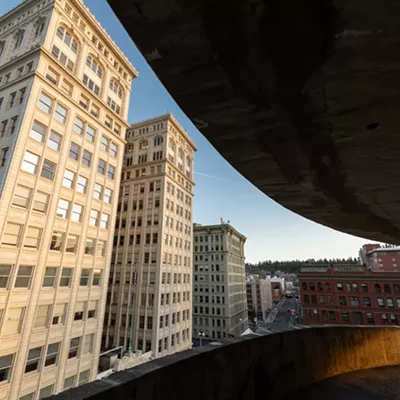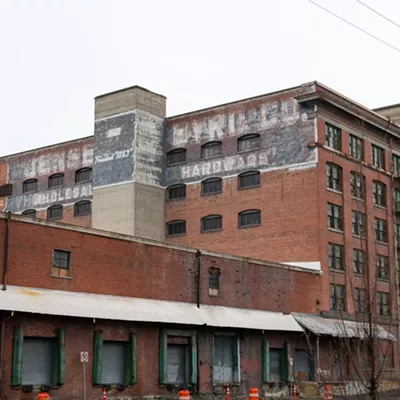
The hundreds of acres just south of Thorpe Road are the largest area of undeveloped land left inside Spokane city limits.
They're a travel corridor for moose and songbirds, and home to wetlands and unique plant and animal species. The nearby Grandview/Thorpe neighborhood is facing increased risks of wildfire and limited infrastructure.
But the land between Thorpe Road, Highway 195 and the western edge of the city has all been zoned "residential" for decades. And Spokane, which is trying to fight urban sprawl, needs about 34,000 units to catch up to its current housing needs.
For years, the city of Spokane, the Washington State Department of Transportation (WSDOT), the Department of Natural Resources (DNR), developers, conservationists and Latah Valley neighbors have all been trying to figure out what to do with the land off Thorpe Road.
The next development steps are about to be announced as soon as the city's hearing examiner releases its next decision about a complicated parcel there. In addition to a 1,000-unit development that's underway despite a yearlong building moratorium in Latah Valley, DNR's Board of Natural Resources recently decided to exchange nearby undeveloped land with the developer in exchange for a grocery store in Bellingham. Here's a look at how the area south of Thorpe got to where it is today, and how conservationists think it could have been different.
VICTORY HEIGHTS
Most Latah Valley development is on pause through May.
More development would need more infrastructure than the neighborhood currently has — there's no fire station despite growing wildfire risk near the hundreds of homes there, and the main route in and out of the area is pinched by two narrow, 100-year-old tunnels.
The Spokane City Council enacted two building moratoriums over the past three years to give the city and neighborhood more time to think about how to move forward. The latest yearlong moratorium started in May 2024.
Some development, though, continues. Blue Fern Development LLC is working on a 1,000-unit housing development off Thorpe Road called Victory Heights, on a 177-acre parcel that was annexed by Spokane in 1907 and has been zoned for residential use since 1929.
The project was already under review when the second moratorium took effect, which means it wasn't subject to the pause.
Blue Fern is close to reaching an agreement with the city and WSDOT on infrastructure improvements the developer needs to fund, including sewer and road updates, to make the new infill viable.
But the city can only place as many restrictions on the property owner as codes allow, city Planning Director Spencer Gardner says. Since the area is zoned residential, its options are limited. While some people would like all new infrastructure to be built before new houses go up, the city is bound by its own codes, he says.
"We are very limited in our ability to say, 'No, you can't do that,'" Gardner says.

BEST INTEREST
The Department of Natural Resources owns 192 acres next to Victory Heights — just a few of the 3 million acres that DNR stewards as state trust land.
State trust lands have a long history. The federal government — after either forcing Native American tribes to sell their land for pennies an acre or seizing it without compensation — gifted trust land to Washington when it became a state and required it be used to build and fund K-12 schools and colleges, plus a few other beneficiaries including the state Capitol and prisons.
DNR is now tasked with making as much revenue as it can from these trust lands for the best interest of the beneficiaries. That often involves signing logging contracts and grazing leases, and other activities that fit the popular imagination for stewarding "natural resources."
But it doesn't exclude commercial real estate. Owning and renting commercial property is the third-largest source of income for DNR behind forestry and agricultural leases. To mitigate risk, it's important to diversify the trust land portfolio, then-Commissioner of Public Lands Hilary Franz said during the Jan. 7 Board of Natural Resources meeting.
"[It's] similar to, I hope, what people do with their own retirement accounts," she said. "In addition to that, part of the value of that diversification was also taking some of the pressure off our other lands, like our agriculture and forest lands, especially in the face of climate change, where we may have drought or forest health issues and wildfire."
A 2021 study by national consulting firm Deloitte found that DNR's income over the previous 25 years had decreased by about 35%. Since then, the department has been looking for ways to modernize its portfolio.
The department deemed its 192 acres off Thorpe Road to be "underperforming," meaning that the trees weren't dense enough to harvest and there was no other way to generate significant revenue from the land. To be better stewards of the trust, Franz stressed the need to ditch the Thorpe asset in favor of a more productive one.
Usually DNR can offload trust lands in one of two ways — transfer the land to a group or municipality that will conserve it, or exchange the land for a better performing asset.
DNR knew the acres next to Victory Heights were of special interest to Blue Fern. Bob Greene, director of real estate advisory solutions and chief appraiser for DNR, said Blue Fern's planned development drove up the assessment of DNR's property to $8.25 million, about $5 million more than it would be worth to anyone else.
The department had also identified a commercial property for sale in Bellingham — a Haggen grocery store and its parking lot. When Martin McElliott, a DNR project manager, presented the proposal to the Board of Natural Resources, he said the Haggen property was appraised for $15.4 million.
The store still has seven years left on its lease and pays more than $900,000 annually in rent for the building and parking lot. McElliott said DNR expects the property could contribute $13 million to K-12 education over the next 15 years.
DNR wants to trade the Thorpe site for the Haggen site, but Blue Fern doesn't own the property in Bellingham, yet. According to an exchange agreement between DNR and Blue Fern, the Haggen property is owned by a limited liability company registered in Delaware.
Per the agreement, the plan is for Blue Fern to buy the Haggen property for $16.22 million and exchange it with DNR, which will give Blue Fern the Thorpe property and about $7 million in cash. The close of the exchange is set for July 15.
DNR gave the city of Spokane and the Spokane Tribe of Indians the opportunity to buy the Thorpe land, but Franz said neither has had the money or willpower to do so.
ANOTHER OPTION?
The proposed exchange between DNR and Blue Fern unleashed major outcry from Latah Valley and Grandview/Thorpe neighbors and conservationists statewide.
A DNR study says the parcel includes at least four rare plant communities but that they're not large enough or high quality enough to preserve. The Department of Fish and Wildlife also warned DNR that the land regularly hosts a mule deer herd that's facing significant habitat loss.
Though it might make sense for the trust's bottom line, trading community green space and precious habitat for a grocery store and parking lot goes against the broader mission of DNR, some say.
"If you look at DNR's overall mission, it's a mission of natural resource stewardship to benefit the citizens of Washington state," says Dan Bernardo, provost emeritus of Washington State University's College of Agricultural, Human and Natural Resources, who also served on the Board of Natural Resources from 2005 to 2013 and lives in Latah Valley.
"With respect to the trust lands, there always is and always will be and always has been this conflict, this tension between maximizing income for the trust versus managing the land for multiple use to benefit the citizens of the state," he continues.
The board usually tries to balance profits and conservation, but in this particular case, Bernardo says, "I thought they didn't try hard enough."
There's a better solution, conservationists say — one that's a win-win-win for the city, DNR and the neighborhood: a trust land transfer.
A trust land transfer would allow DNR to offload the land to the city and earn money without compromising conservation, says Tom Uniack, executive director of Washington Wild, a nonprofit that advocates for these kinds of deals.
In a trust land transfer, the Legislature would pay the land's assessed value to DNR, the land would be gifted to the city for conservation, and DNR could use the assessed value payment to buy a higher performing asset for its portfolio.
The city of Spokane applied for a trust land transfer for the Thorpe site in 2021, Uniack says, and the project was added to the state's list of potential transfers in August 2024. It was found to meet the best interests of the trust.
"Then all of a sudden, an agency that normally we count on operating like a school bus became a Ferrari," Uniack says.
DNR started pushing for an exchange that results in more development, he says, which is the opposite of a transfer.
The Board of Natural Resources approved the Thorpe land exchange during the Jan. 7 meeting, the last meeting before Franz was replaced by Commissioner of Public Lands Dave Upthegrove.
Uniack thinks the board didn't consider a trust land transfer thoroughly enough or take into account strong local opposition.
A trust land transfer would take much longer. There are currently 34 possible trust land transfers across the state, and the Thorpe land is 18th on the priority list. The top eight projects were sent to the Legislature this session with a request for $30 million to fund them all.
But state lawmakers face a severe budget crunch this session, and though both House and Senate Democrats included some trust land transfers in their proposed budgets, neither designates a full $30 million for the transfers.
Uniack guesses that it would only take a couple more legislative sessions to fund a trust land transfer for the Thorpe property. But the window to keep a transfer possible is closing.
The Thorpe land exchange was signed on Feb. 24. It includes a 90-day termination period where either party can exit the agreement if, after any new environmental or feasibility studies, "the property is not suitable for the party's intended use."
"We will continue to urge the Board of Natural Resources to terminate the contract," writes Jeff Lambert, president of local conservation group Friends of the Bluff, in an email to the Inlander. "We will continue to build coalitions of conservation groups, neighborhood councils and elected officials to stop the exchange."
So far, neither the board nor the new lands commissioner have expressed any interest in revisiting the decision. DNR would not comment for this story, but offered a statement Upthegrove gave on April 1.
"I understand and heard clearly the concerns raised regarding the Thorpe land exchange. I have personally hiked the property with conservation advocates and appreciate the value of the natural features on the landscape. However, the exchange was approved unanimously by the Board of Natural Resources in January prior to me taking office. Regardless of whether or not I would have made a different decision, no member of this board expressed an interest in revisiting the decision," Upthegrove's statement reads. "Since taking office, I have respected past decisions of the Board of Natural Resources and have remained focused on the future. I look forward to approaching future decisions with thoughtful conservation values and a commitment to meaningful public engagement." ♦





















